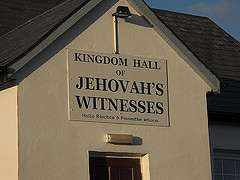Jehovah’s Witnesses, Easter, Paganism, and Passover

The following news item was of interest:
But a week earlier, April 17, members of the Jehovah’s Witnesses will celebrate their most important date, the annual memorial of Jesus’ death known as “the Lord’s Evening Meal.” Although Easter is observed by many more people and ingrained in our society by such customs as the Easter bunny, Easter egg hunts and candy treats, Jehovah’s Witnesses hold firm to their belief that the celebration of Easter is a mistake based on paganism rather than a close reading of the Bible. http://www.gilroydispatch.com/lifestyles/274419-some-christians-shun-easter-celebrations
Early Christians observed Passover. After compromise set it, Passover from the Greco-Roman related faiths became switched to a Sunday. Then, over time, it became a Sunday resurrection holiday as opposed to mainly the Christian Passover observance.
Over time, especially in the Western world, customs associated with pagan worship became incorporated into the Easter observances. Easter itself is not a biblical term, but instead is a reference to a pagan goddess.
The Catholic Encyclopedia notes:
The English term, according to the Ven. Bede (De temporum ratione, I, v), relates to Estre, a Teutonic goddess of the rising light of day and spring…Easter is the principal feast of the ecclesiastical year. Leo I (Sermo xlvii in Exodum) calls it the greatest feast (festum festorum), and says that Christmas is celebrated only in preparation for Easter…The connection between the Jewish and the Christian Pasch explains the movable character of this feast. Easter has no fixed date, like Christmas, because the 15th of Nisan of the Semitic calendar was shifting from date to date on the Julian calendar. Since Christ, the true Paschal Lamb, had been slain on the very day when the Jews, in celebration of their Passover, immolated the figurative lamb, the Jewish Christians in the Orient followed the Jewish method…For this observance they claimed the authority of St. John and St. Philip.
In the rest of the empire another consideration predominated. Every Sunday of the year was a commemoration of the Resurrection of Christ, which had occurred on a Sunday. Because the Sunday after 14 Nisan was the historical day of the Resurrection, at Rome this Sunday became the Christian feast of Easter…
Men and women…In the Neumark (Germany) on Easter Day the men servants whip the maid servants with switches; on Monday the maids whip the men. They secure their release with Easter eggs. These customs are probably of pre-Christian origin (Reinsberg-Düringsfeld, Das festliche Jahr, 118)…
The Easter Rabbit The Easter Rabbit lays the eggs, for which reason they are hidden in a nest or in the garden. The rabbit is a pagan symbol and has always been an emblem of fertility (Simrock, Mythologie, 551)…
The Easter Fire The Easter Fire is lit on the top of mountains (Easter mountain, Osterberg) and must be kindled from new fire, drawn from wood by friction (nodfyr); this is a custom of pagan origin in vogue all over Europe, signifying the victory of spring over winter
(Holweck F. G. Transcribed by John Wagner and Michael T. Barrett. Easter. The Catholic Encyclopedia, Volume V. Copyright © 1909 by Robert Appleton Company. Online Edition Copyright © 2003 by K. Knight. Nihil Obstat, May 1, 1909. Remy Lafort, Censor. Imprimatur. +John M. Farley, Archbishop of New York).
Thus, Catholic scholars have long understood that there were pagan connections with many symbols associated with Easter celebrations. And those pagan elements were not observed by early Christians–they were NOT early traditions of the church.
And while the Jehovah’s Witnesses have many doctrinal misunderstandings, they basically are correct that Christians did not keep Easter and that it has pagan element.
Jesus, Himself, kept Passover (Luke 22:7-13) and told His followers to do so (Luke 22:14-20). Do you follow Jesus?
Articles of related interest may include:
Similarities and Differences Between the Jehovah’s Witnesses and the Living Church of God Both groups claim to represent the original Christian faith. Do you know much about them? Both groups have some interesting similarities, but many major differences. Would you like information on how to deal with Jehovah’s Witnesses?
Passover and the Early Church Did the early Christians observe Passover? What did Jesus and Paul teach? Why did Jesus die for our sins?
Melito’s Homily on the Passover This is one of the earliest Christian writings about the Passover. This also includes what Apollinaris wrote on the Passover as well.
TPM: Passover on the 14th or 15th? While the LCG observes Passover on the 14th, some observe it on the 15th. Why is the 14th correct?
The Night to Be Observed What is the night to be much observed? When is it? Why do Jews keep Passover twice and emphasize the wrong date?
Should Christians Keep the Days of Unleavened Bread? Do they have any use or meaning now? What is leaven? This article supplies some biblical answers.
Is Lent a Christian Holiday? When did it originate? What about Ash Wednesday? If you observe them, do you know why?
What Happened in the Crucifixion Week? How long are three days and three nights? Was Palm Sunday on a Saturday? Did Jesus die on “Good Friday”? Was the resurrection on Sunday? Do you really know? Who determined the date of Easter?
Did Early Christians Celebrate Easter? If not, when did this happen? What do scholars and the Bible reveal?The History of Early Christianity Are you aware that what most people believe is not what truly happened to the true Christian church? Do you know where the early church was based? Do you know what were the doctrines of the early church? Is your faith really based upon the truth or compromise?
 |
Tweet |
|